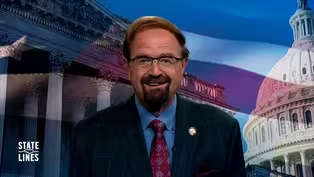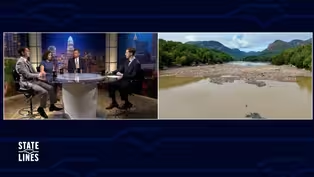
Western NC’s Economic Outlook After Hurricane Helene
Clip: Special | 6m 38sVideo has Closed Captions
Western NC’s economic outlook after Helene, plus state and federal funding of recovery efforts.
Sen. Tim Moffitt (R-District 48), Rep. Lindsey Prather (D-District 115) and Rep. Jake Johnson (R-District 113) discuss western NC’s economic outlook eight months after Hurricane Helene, from tourism to state and federal relief funding. Host: PBS NC’s David Hurst.
Problems playing video? | Closed Captioning Feedback
Problems playing video? | Closed Captioning Feedback
State Lines is a local public television program presented by PBS NC

Western NC’s Economic Outlook After Hurricane Helene
Clip: Special | 6m 38sVideo has Closed Captions
Sen. Tim Moffitt (R-District 48), Rep. Lindsey Prather (D-District 115) and Rep. Jake Johnson (R-District 113) discuss western NC’s economic outlook eight months after Hurricane Helene, from tourism to state and federal relief funding. Host: PBS NC’s David Hurst.
Problems playing video? | Closed Captioning Feedback
How to Watch State Lines
State Lines is available to stream on pbs.org and the free PBS App, available on iPhone, Apple TV, Android TV, Android smartphones, Amazon Fire TV, Amazon Fire Tablet, Roku, Samsung Smart TV, and Vizio.
Providing Support for PBS.org
Learn Moreabout PBS online sponsorship- Senator Moffitt, I wanna start with you.
That sentiment we heard in that story, business owners are ready for people to come back.
Is that what you're hearing from your constituents?
- It is, and candidly, after watching the video, the weight of that, it just made us relive through that entire storm and that catastrophe.
But it's true and 90% of the mountains are open for business.
We appreciate you putting this panel of discussion together because it's important for us to convey to people that we experienced a severe blow to our economy, but we are resilient and we've been able to stand back up and we would like people to come back and visit with us.
- And Representative Prather, build off that a little bit.
What do you think are some of the biggest obstacles for folks coming back?
- Absolutely, so I think the first one is just getting the message that we are reopen.
You know, the second is what the speaker in the segment just said there at the end, you know?
Things are gonna look a little bit different.
There might be some menus that are limited right now in terms of, you know, what farmers are able to get things to the restaurants.
But for, you know, so just getting the message out there that we are open, but making sure people know that it is gonna look a little bit different, but it's very important that they come back and help support the recovery.
- Representative Johnson, what does that look like getting the message out there, especially ahead of a summer and fall tourism season that many business owners rely on?
- Absolutely, and I represent the Lake Lure Chimney Rock area that has very similar situations we're seeing.
That is the primary economic driver there, that state park, the views which you're used to seeing when you get there, the river right beside it.
Totally different landscape now.
So we're looking at how do we rebuild, not only rebuild, but rebuild more resilient so when people come back they can enjoy it and will again look very different, but we'll still have those same characteristics.
- We'll talk about Lake Lure here in just a minute, but Senator Moffitt, I wanna talk about money a little bit first.
The House and Senate have both passed the state level, about $1.4 billion in relief for Helene, just over several different packages.
The house just approved about 464 million in another relief package.
What's the latest with the Senate?
What are discussions going on there?
- Yeah, so the Senate's definitely going to either take up the House relief effort, probably as part of a broader budget negotiating strategy, but I do believe that we will probably exceed what the House has appropriated.
We're looking at more, probably $700 million more to round it out to about 2.1 billion total that we've been able to appropriate from Raleigh to the mountains.
- You just have to one up your colleagues in the house, don't you?
- We do, we do.
- If there was ever a time.
- For real.
- Representative Prather, talk about how we get that money to the people who actually need it in your district.
What does that look like?
- Yeah, so I think that's really important for folks to keep in mind, you know, we hear about money being appropriated in Raleigh and then we need to make sure that we're following through, not just patting ourselves on the back, right?
And saying we did a good thing, but following through and making sure that money is actually getting to folks on the ground.
So there's a lot of ways, I know that all of us legislators are continually checking in with our constituents to make sure that they're getting what they need, right?
If we're standing up some kind of grant program, we're following back up to make sure, hey, are you able to access that application?
So we're trying to get that message out there for sure, and just make sure that folks know what is available out there and make sure folks know that they're willing, you know, that they're welcome to inform us of what they still need.
So I know there's a lot of needs still out there, including things like grants for small businesses and, you know, flexible funding, revenue replacement for local governments.
So things that we will continue to work on, but wanna make sure folks know about the stuff that we've already passed for sure.
- And this is obviously a process, Representative Johnson, but to Representative Prather's point, there are still needs out there.
What is your message to some of the constituents who might be getting a little impatient about the time is taking to get these funds?
- Oh, absolutely.
And I can understand the frustration and the first thing we did when we were putting together this Helene package, we asked for what money had already gotten out the door.
And this is an important time to distinguish between obligated funds and funds that have already been expend and already been spent.
That means likely they're already in the hands of the constituent, the business that needs them.
Obligated money may not be, it may be obligated, but the check hasn't actually gotten to the person who needs it.
So when we're looking at what pots to invest in, whether it be small businesses, you know, we had the wildfires out west, fire mitigation was a big one in this one.
We're looking at all these pots.
We need to look at one high priority in the sense of public safety, but also, what money has been spent versus what hasn't.
If the application process hasn't even opened yet and there's another pot of money that has been totally spent, we wanna make sure we prioritize that one first to make sure we're getting to that immediate need.
And if there's something, there was about 50 million in this last bill that we called back that wasn't being spent, there wasn't as much of a demand for it.
Let's put it toward programs people actually need.
- Senator Moffitt, let's pivot to some of the federal funds.
FEMA recently announced that they decided not to agree with North Carolina's request to cost match the state funding.
How does that impact, if any, some of the discussions going on in the general assembly?
- I think at the very beginning, our goal was to keep FEMA at a 90% reimbursement to the state.
So when we were able to secure 100%, I felt like that was a bonus that our state received in a very difficult time.
To be declined on the continual 100% reimbursement is a challenge for us.
It's disappointing, but again, we were kind of prepared for the 90, 10.
So I think it's traumatic effect on our recovery is not gonna be there.
But it would certainly be nice if they would, you know, stick with the 100%.
- Representative Prather, do you wanna weigh in?
I saw you nodding there.
- Yeah, so I agree that it wasn't a total surprise when the request was turned down.
I do think, you know, folks might think, well, you know, how big of a difference is 10% really.
It's hundreds of millions of dollars that our state is now going to have to continue to put into this recovery that we had been hoping would come from the federal government.
The context here being that this is a 60-plus billion dollars disaster.
We've all known from the very beginning that we were never gonna be able to make everyone whole, right?
There's not gonna be $60 billion put into this recovery, but I certainly think we can do more than 1.4 billion.
And I certainly think that we need to expect more from the federal government.
We can't handle this on our own in North Carolina and we need continued support.
U.S. Rep. Chuck Edwards on Western NC After Hurricane Helene
Clip: Special | 5m 35s | U.S. Rep. Chuck Edwards (R-NC) talks about western NC eight months after Hurricane Helene. (5m 35s)
Western NC Cleanup Efforts After Hurricane Helene
Video has Closed Captions
Clip: Special | 5m 2s | Cleanup efforts in western NC after Hurricane Helene, plus the environmental impact of the storm. (5m 2s)
Providing Support for PBS.org
Learn Moreabout PBS online sponsorship
- News and Public Affairs

Top journalists deliver compelling original analysis of the hour's headlines.

- News and Public Affairs

FRONTLINE is investigative journalism that questions, explains and changes our world.












Support for PBS provided by:
State Lines is a local public television program presented by PBS NC

